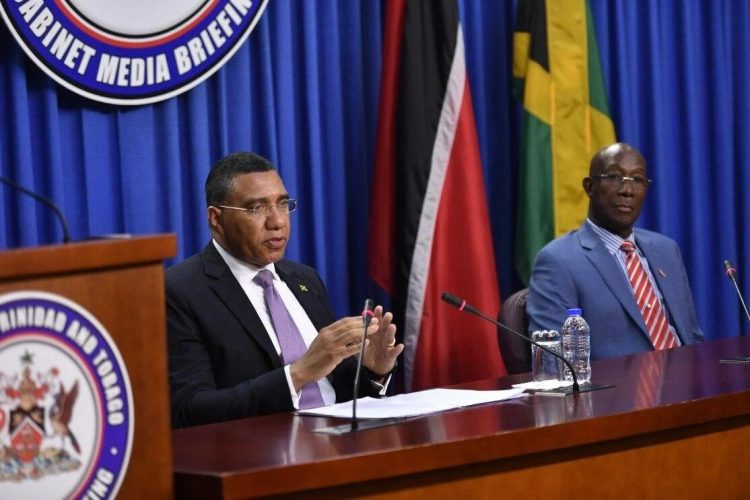Commander of the US Southern Command (SOUTHCOM), four-star Army General Laura Jane Richardson yesterday highlighted the importance of girls having female role models in non-traditional roles as she underscored that opportunities to promote this must also be made available.
In a country where the Guyana Defence Force yesterday told Stabroek News that only “approximately 10 per cent” of its staff are women, Richardson said that more women might be more inclined to be recruited if opportunities are highlighted.
“There are many things women can do in Guyana in the Defence Force. I think it is a matter of highlighting that; just all the opportunities that are available,” General Richardson yesterday opined at a press conference she hosted with Guyana Defence Force Chief of Staff, Brigadier Godfrey Bess.

She also noted that seeing other females in leadership and non-traditional roles plays an important part. “I would like to say that you can’t be what you can’t see… I think it is important to see women in non-traditional roles… and I think it is important what opportunities [are there].”
General Richardson is here for the inaugural Caribbean Women, Peace and Security conference currently being held at the Marriott Hotel, George-town. The conference is a part of the United States Women, Peace and Security Program (WPS); a national effort to promote the meaningful contributions of women in the defence and security sectors around the world.
Among attendees is Jamaica’s first female Chief of Staff and its first officer to serve at sea; Rear Admiral Antonette Wemyss-Gorman.
Some eighty delegates representing 12 Caribbean countries are participating in the two-day conference which is being held under the theme: “Women in leadership, promoting the Women, Peace and Security agenda”.
General Richardson also pointed out that it has been shown that women excel in non-traditional roles when given the opportunities, but that the norm should not be waiting for those sparse opportunities.
“Open up the other fifty per cent of the talent pool out there and give women the opportunity. You have to start now or how else would you create another General Richardson? How else do you create another Antonette Wemyss-Gorman?” she queried.
Of her own experience, she noted that many of her accomplishments were afforded because of her being in the military. “Sometimes I can’t believe I’m here doing this. I have been able to work at different places; work at our Capitol, work at our White House; I’ve been deployed in combat… I have been able to do many things. I would have never been able to do this, had I not been in the military.”
She believes that women can help to make the security forces stronger and bring a different perspective to problem solving.
“I think that women in our security forces make our forces stronger, makes them better, it gives a different perspective on how to tackle the really hard, complex threats that are out there.”
Guyana’s army head noted the changing roles of women in the military here as he stated that female ranks are now given the opportunity to serve at border posts throughout the country.
Championing
“As Chief of Staff, I will be championing for women in the defence force to have their rightful places,” he said.
Bess said that issues raised by army women are the same as those with other jobs, such as balancing their work with family life.
And given that the army is “very family oriented”, it has put in specialised programmes to cater to the needs of working mothers and spouses, such as a daycare at the bases. Time schedules also give them “adequate time to be there for their families,” according to Bess.
“Women here have raised concerns about being away from their families. And what we do for our female soldiers that are working and are parents, one of the initiatives that we would have included over the years, is being able to assist to take care of their children while they are at work. We have a day care….”
According to the United States State Department, with the passage of the Women, Peace, and Security Act of 2017, the US became the first country in the world with a comprehensive law on Women, Peace, and Security.
The US Government also released the 2019 US Strategy on Women, Peace, and Security, and the State Department Implementation Plan in 2020, which has strengthened the US’ priorities of protecting and supporting women in efforts to prevent conflict, promote peace, and countering violent extremism. The Secretary’s Office of Global Women’s Issues is proud to serve as the lead coordinating office for the State Department’s WPS efforts.
For SOUTHCOM, its WPS Program “recognizes the diverse roles women play as agents of change in preventing and resolving conflict, countering terrorism and violent extremism as well as building post-conflict peace and stability in our Hemisphere.”
It is centred on four pillars: Participation, Prevention, Protection, and Relief and Recovery.
“This foundation provides unique engagement opportunities to strengthen bilateral relationships with regional partners through collective efforts that reinforce women’s empowerment, meaningful participation in decision-making, protection from violence, and access to resources,” SOUTHCOM says of the programme.
“Inclusiveness increases mission effectiveness and drives positive outcomes. With women making up over 50% of the population, they bring unique and necessary skills to security forces. We know that when we invest in a woman, she changes not only her own life, but also that of her family and community. Add that change in a key institution, such as the military, and she will change that institution and her country. While structural changes to recruitment, training, and promotion systems are critical, we must also acknowledge the contributions of talented women across the security sector. We have made it our mission to empower women by highlighting those who are breaking barriers in our region. We want to make those that are invisible, visible,” it adds.





